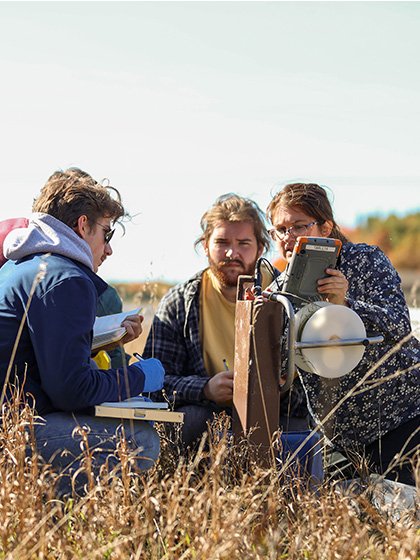


Environmental Analytics
Minor
Overview of the environmental analytics minor
Use data to solve Earth's biggest challenges with an environmental analytics minor. Study topics like climate change, water systems and resource management with a focus on making a long-term impact.
You'll learn how to:
- Collect, analyze and interpret large-scale environmental data.
- Use modeling to predict changes.
- Develop solutions to protect Earth's future.
This minor is open to all students and pairs well with studies in environmental science, data science, geography or geographic information systems. You'll graduate with the skills to make data-driven decisions and to create a more sustainable future for all.
Program Snapshot
Why study to become an environmental analyst?
As an environmental analytics student, you'll study data analysis, statistical modeling and data integrity. You'll use some of the largest data sets available to create charts, tables, graphs and other visuals that clearly communicate information.
These skills will help you solve real-world issues like:
- Monitoring pollution levels.
- Studying the effects of climate change.
- Estimating climate risk.
- Developing properties and land sustainably.
Environmental analysts work at government agencies, nonprofits, research institutions and private companies. The profession is rapidly growing! The job outlook for environmental specialists is expected to grow over the next decade.
Highlights of the environmental analytics minor
To prepare for environmental analyst roles, you'll:
- Explore and quantify data: You'll examine geoscientific and environmental data for inconsistencies, limitations or errors that may hinder analysis.
- Use industry-standard software: Analyze and visualize data with the same software packages used by professionals in the field.
- Communicate results: You'll learn how to translate analytical data into information people can use to make decisions.

Lower your tuition with departmental scholarships
Earn thousands of dollars a year with special scholarship opportunities through the Department of Geography and Environmental Studies. These awards are open to both first-year and returning students who are studying within the field.
The best part? They can be combined with other CMU merit and third-party awards to lower the cost of your tuition.
Request Information about CMU
By submitting this form, I agree to receive calls, emails and/or text messages from Central Michigan University to discuss furthering my education.